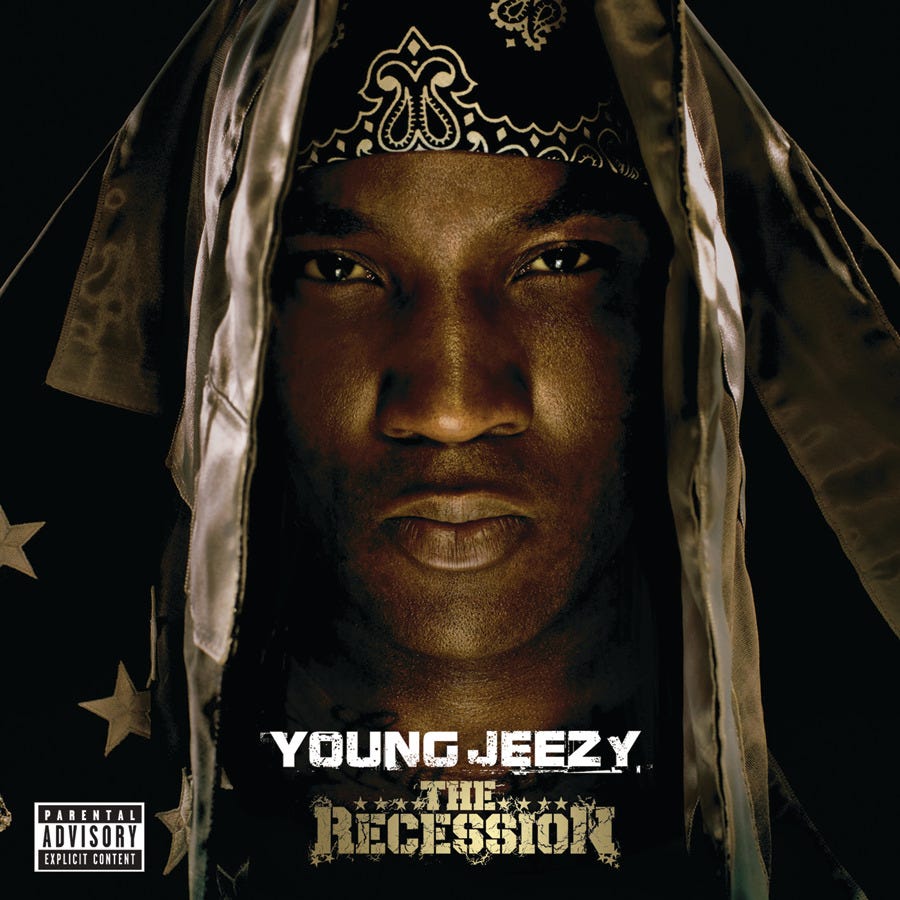Retrospective Review: The Recession by Young Jeezy
A diverse turn in Young Jeezy's 'The Recession' fifteen years later.
Young Jeezy’s The Recession is an intriguing musical artifact. Released during the economic downturn in 2008, Jeezy uses the moment to broaden his usual repertoire, enriching the expected themes of street life with an unexpected undercurrent of social commentary. It’s a fascinating shift, a ripple of growth and change in an artist once seen as having a singular focus.
At first glance, Jeezy’s evolution seems paradoxical, a contradiction within the perceived identity of a trap artist. We’ve grown accustomed to the tales of street hustle, life’s hardships, and triumphs in the trap. Now, Jeezy layers these narratives with examinations of broader social contexts, showing how these systemic forces shape and define the world of his lyrics.
Take “Crazy World,” for instance. Here, Jeezy’s lyrics meander through the shared struggles of those trapped in an unforgiving economic system. The song is a prime example of how Jeezy’s work on The Recession goes beyond the confines of trap music, adding a layer of socio-political consciousness.
“Put On,” featuring Kanye West, the album’s first single, its infectious production by Drumma Boy and catchy hook masking a deeper discourse on loyalty, responsibility, and identity. The song encapsulates Jeezy’s personal struggle and commitment to his community, a fusion of self-expression and communal ethos.
The Recession is not just a social critique, though. The album is still packed with the adrenaline-pumping street anthems we’ve come to expect from Jeezy. “Welcome Back” is a bravado-laden reintroduction to Jeezy’s world, while “Who Dat” offers a dose of swagger and defiance.
Yet, even in these more traditional tracks, there’s a subtle shift in Jeezy’s voice, a hint of the changes brewing beneath the surface. It’s as though he’s on the cusp of discovering a broader range of expression on both prospects of his experiences and the world around him.
On The Recession, Jeezy showcases a complexity that transcends the stereotypes of trap music, even if the familiar beats and narratives occasionally veil that complexity. He offers an alternative way of looking at trap music.
The album is not without its flaws. There are moments when Jeezy struggles to balance his newfound depth and established identity. At times, the social themes feel forced, as though Jeezy is still finding his footing in this broader landscape.
Despite these occasional missteps, The Recession is a significant phase in Jeezy’s career, a marker of growth and evolution. The album is a striking blend of trap music’s energy and a budding social consciousness, making it a critical listening experience for any fan of the genre.
The third album from Young Jizzle is a fascinating snapshot of an artist in transition, exploring the possibilities of trap music. It’s an interesting step in the right direction, even if it could be more seamless between personal and political integration. One can’t help but look forward to where Jeezy’s path will lead next.
“Dollar Circulate,” a song with deep, thudding beats overlaid with Jeezy’s gravelly voice, presents an eerie picture of economic inequality. And yet, amidst the hardship, Jeezy emphasizes the relentless hustle, the sheer will to survive, even thrive, that defines his community.
“Amazin’” offers an upbeat counterpoint to the harsh realities depicted in other songs. Here, Jeezy celebrates his success, giving his audience a glimpse into the world that his hard work has won him. The catchy chorus and the sleek beats all speak of a man who has reached the peak yet remains rooted in the reality of where he came from.
Yet, for all its social commentary, The Recession doesn’t neglect the personal. In “Vacation,” Jeezy addresses the toll that the constant struggle, the relentless hustle, can take. It’s a somber reflection, a rare moment of vulnerability that adds another layer of complexity to the album.
The closing track, “My President,” featuring Nas, is a rousing finale that encapsulates the spirit of hope and change that defined the era. Jeezy’s joy at seeing Barack Obama in the White House is palpable, his pride in his country’s progress almost tangible. The song serves as a powerful end to the album, a reaffirmation of hope amidst hardship.
With its fusion of the personal and the political and its subject matter of social themes within the context of trap music, the album redefines the boundaries of trap music. Despite minor missteps, The Recession remains some of Jeezy’s best work, offering a fresh and intriguing perspective on a genre often stereotyped as one-dimensional.



